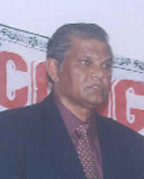Says Brassington’s disclosure could have been handled differently
The announcement by the Government of Guyana that it is offering Atlantic Tele-Network (ATN) first refusal on a buyout of its 20 per cent shares in the Guyana Telephone and Telegraph Company (GT&T) is likely to be on the agenda of the local telecommunications company’s majority shareholder at its next meeting, according to the company’s Chief Executive Officer Major General (ret’d) Joe Singh.
Speaking with Stabroek Business earlier this week Singh said that ATN’S Chief Executive Officer Michael Pryor had already stated that the offer by government to sell its shares to ATN would have to be considered by the Board of the company. However, Singh told Stabroek Business that, as yet, GT&T had no information regarding a date for the next ATN Board meeting. He said that ATN’s response would be made known to the government as soon as the matter is considered by the Board.

Meanwhile, Singh told Stabroek Business that GT&T was unhappy over the manner in which the public announcement regarding government’s intention to dispose of its stake in the company had been made. Singh said that the public announcement by Head of the Privatization Unit Winston Brassington shortly after the conclusion of last week’s GT&T Annual General Meeting that government was offering ATN first refusal on its shares in the company could have been handled differently.
“We were a bit disappointed that immediately after the Annual General Meeting statements were made to the media.” Singh said that while there was no protocol governing the dissemination of information and while it can be argued that Brassington was exercising his right as the government’s representative on the Board, the company had hoped that it would have been allowed to inform the Board of ATN that the Government of Guyana had tabled its desire to sell its shares and that the first offer had been made to the Board. “I believe that that would have been preferable to the Board receiving the information through the newscast that evening,” Singh said.
Despite the grouse over the announcement, however, Singh told Stabtroek Business that he believed that the often prickly relations between the company and the political administration were better than they had been two or three years ago. “I would say that we are now in a much better position in that the number of subjective statements has reduced.”

Interconnectivity
Meanwhile, Singh told Stabroek Business that the long delay that preceded the signing of an SMS interconnectivity agreement with DIGICEL had been the result of several technical and other factors. He said that apart from the technical aspects of the project there were other more strategic issues which had surfaced during the interconnectivity talks with DIGICEL. He said that those issues had to do with, among other things, the state of the current monopoly negotiations between the government and ATN and the knowledge that the government was taking steps to produce post-liberalization regulations for the telecommunications sector. He said that GT&T was concerned that in signing the interconnectivity agreement it might place itself in jeopardy after the new regulations had been promulgated. GT&T, Singh said, felt that it needed to see what obtained in the new regulations before moving ahead with the signing of the interconnectivity agreement. He disclosed that while GT&T had still not seen the new draft regulations it has chosen to sign the interconnectivity agreement after DIGICEL had appealed to the Public Utilities Commission (PUC) and the body had fixed a hearing on the matter for today. “We did not want, necessarily, to have this issue go to a hearing and then find that we were further in jeopardy by having the PUC make a ruling on interconnection and on other issues,” Singh added.
Meanwhile the GT&T Chief Executive Officer restated his view that the company was not enjoying a level playing field and was, instead, “operating under some degree of stress.” He said that while he had no wish “to point any fingers,” the company had already provided a number of examples of cases in which its promotions had been stymied while those of its competitor had been allowed to continue.
Singh said that rather than become overwhelmed by the problem GT&T has chosen to “stand up and fight, whether we have to use the court of law or public opinion to ensure that people are aware of the facts.” Singh said the fact that ATN had already built a costly and competitive state of the art telecommunications infrastructure in Guyana and is now seeking to reinforce that infrastructure is proof of the company’s long-term commitment to the future of the industry. “Our commitment to continuing to modernizing the telecommunications sector in Guyana is an indication of that iron-clad guarantee. Of course, as a caveat, I would say that we hope that the government acknowledge and recognize this demonstration of commitment by ensuring that the post-liberalization environment does not see us worse off than we are now,” Singh added.





